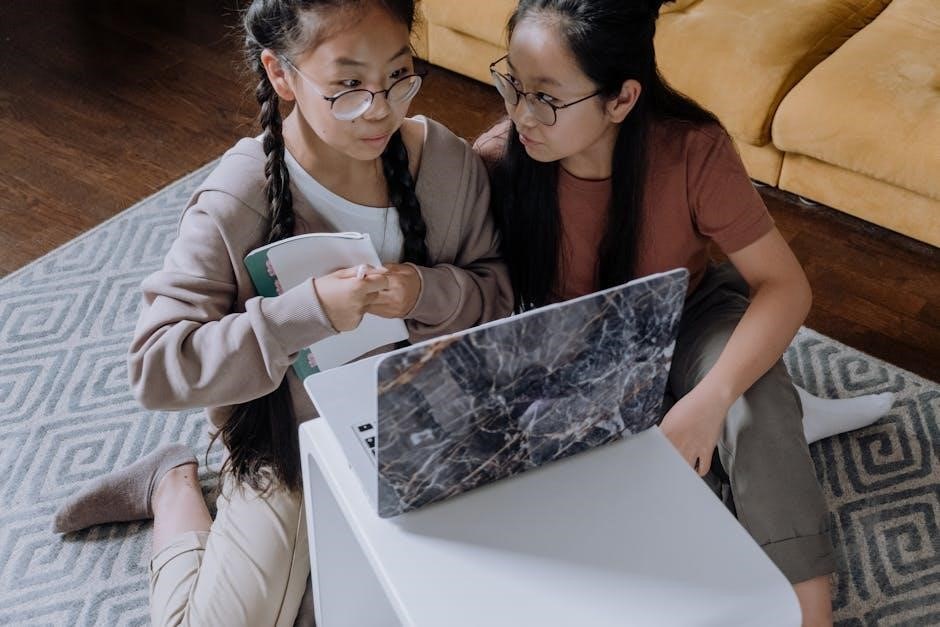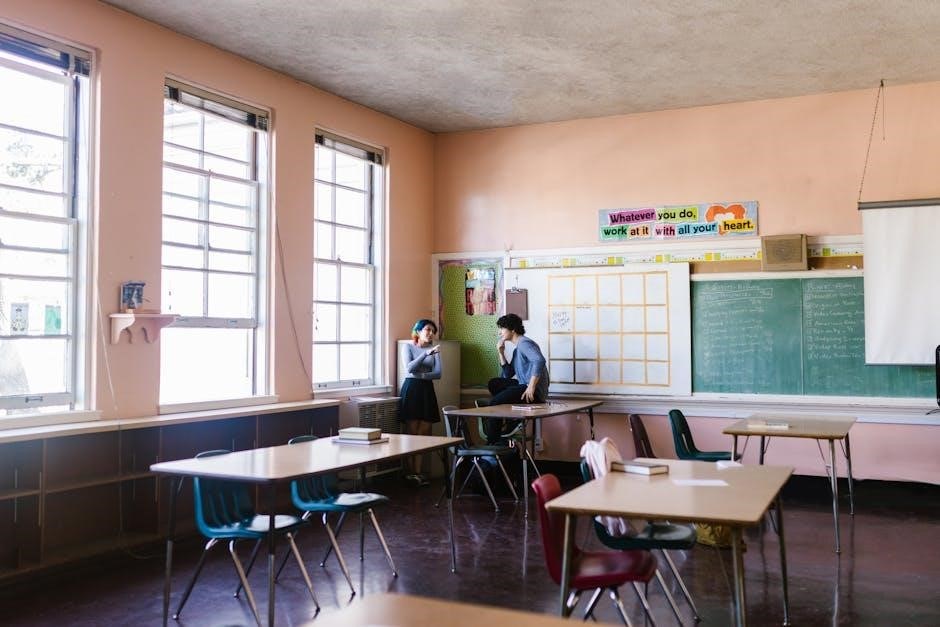The 7 Habits of Highly Effective Teens by Sean Covey is a self-help guide tailored for teenagers, offering practical advice on self-improvement and personal growth․
Overview of the Book and Its Purpose
The 7 Habits of Highly Effective Teens is a self-help guide tailored for teenagers, offering practical advice on self-improvement, goal-setting, and personal growth․ It adapts Stephen Covey’s original principles for a younger audience, addressing challenges like peer pressure, academic stress, and relationships․ The book aims to empower teens to develop habits that foster success, confidence, and resilience․
By focusing on timeless principles, Sean Covey provides actionable strategies to help teens navigate their formative years effectively․ The book’s purpose is to equip young people with tools to improve self-image, achieve their goals, and build strong relationships, ensuring a positive and productive life․
Author Background: Sean Covey and His Inspiration
Sean Covey, the author of The 7 Habits of Highly Effective Teens, is the son of Stephen R․ Covey, who wrote the original 7 Habits book․ Sean drew inspiration from his father’s principles but tailored them specifically for teenagers․ His motivation stemmed from understanding the unique challenges teens face, such as peer pressure, self-esteem issues, and academic stress․ Sean’s goal was to provide practical, relatable advice to help teens build confidence, achieve their goals, and navigate life’s complexities effectively․

Habit 1: Be Proactive
Be Proactive encourages teens to take responsibility for their choices and actions, focusing on what they can control rather than reacting to circumstances․ This habit emphasizes self-awareness and personal agency, helping teens build confidence and resilience to navigate life’s challenges effectively․
Understanding Personal Responsibility
Understanding Personal Responsibility is the foundation of Habit 1: Be Proactive․ It teaches teens to recognize their ability to choose responses to life’s challenges, rather than being controlled by emotions or circumstances․ By acknowledging their influence over outcomes, teens can shift from a reactive to a proactive mindset․ This principle encourages self-awareness, accountability, and intentional decision-making, empowering teenagers to own their actions and their impact on the world around them․ Personal responsibility is key to building resilience and confidence in navigating life’s complexities․
Developing Self-Awareness and Agency
Developing Self-Awareness and Agency empowers teens to recognize their thoughts, emotions, and actions, enabling them to make intentional choices․ By understanding their personal values and goals, they can align their actions with what truly matters․ This habit encourages teens to take ownership of their decisions and behaviors, fostering a sense of control and confidence․ Self-awareness and agency are essential for building resilience, making better choices, and creating a positive, purpose-driven life․ This mindset helps teens navigate challenges effectively and grow into capable individuals․
Habit 2: Begin with the End in Mind
Begin with the End in Mind teaches teens to set clear, long-term goals and create a personal mission statement․ This habit helps them focus on what truly matters, guiding their decisions and actions toward a purposeful future, while staying aligned with their values and aspirations․
Setting Long-Term Goals and Vision
Setting long-term goals and vision is about identifying what matters most and where you want to be in the future․ By creating a clear vision, teens can make decisions that align with their values and aspirations․ This habit encourages them to think deeply about their purpose and what they want to achieve, helping them stay focused and motivated․ A well-defined vision serves as a roadmap, guiding their actions and decisions toward a meaningful and fulfilling life, while also fostering a sense of direction and clarity․
Creating a Personal Mission Statement
Creating a personal mission statement is a powerful tool for self-discovery and direction․ It helps teens clarify their values, beliefs, and long-term goals, serving as a guide for making decisions․ By defining their purpose, they can align their actions with what truly matters to them․ This statement becomes a compass, empowering them to stay focused on their aspirations and make choices that lead to fulfillment and success․ It’s a meaningful way to express their identity and vision for life, fostering clarity and purpose․
Habit 3: Put First Things First
Habit 3: Put First Things First emphasizes effective time management and prioritization․ Sean Covey introduces the Time Management Matrix to help teens focus on what truly matters, balancing responsibilities with enjoyable activities and minimizing time wastage, leading to better task management and reduced stress․
Time Management and Prioritization
Effective time management is crucial for balancing school, relationships, and personal growth․ Sean Covey introduces the Time Management Matrix, categorizing tasks into four quadrants: urgent and important, important but not urgent, urgent but not important, and neither․ By focusing on what truly matters, teens can reduce stress and increase productivity, allowing them to allocate time wisely for responsibilities, hobbies, and self-care, fostering a healthy and productive lifestyle․
Using the Time Management Matrix
The Time Management Matrix helps teens prioritize tasks by dividing them into four categories: urgent and important, important but not urgent, urgent but not important, and neither․ Focusing on the first two quadrants ensures they tackle critical tasks first, reducing procrastination and stress․ This tool encourages teens to delegate or eliminate less important activities, freeing up time for personal growth, relationships, and enjoyable activities, leading to a more balanced and fulfilling life․

Habit 4: Think Win-Win
Cultivating an abundance mentality, Habit 4 encourages teens to seek mutual benefits in relationships, fostering trust and collaboration for everyone’s success․
Cultivating an Abundance Mentality
Cultivating an abundance mentality means believing there’s enough success to go around․ This habit teaches teens to shift from a scarcity mindset to one of collaboration and mutual benefit․ By focusing on win-win situations, individuals learn to value teamwork and shared achievements․ An abundance mentality fosters empathy, trust, and positive relationships․ It encourages teens to seek solutions where everyone gains, rather than competing selfishly․ This approach not only builds stronger connections but also promotes a more supportive and inclusive environment for personal and collective growth․
Building Positive Relationships
Building positive relationships is a cornerstone of personal and social success․ Teens learn to foster trust, empathy, and mutual respect in their interactions․ By understanding others’ perspectives and communicating effectively, they can navigate conflicts and strengthen bonds․ This habit emphasizes the importance of being supportive and reliable, creating a foundation for lasting friendships and collaboration․ Positive relationships not only enhance emotional well-being but also provide a supportive network for overcoming challenges and achieving goals together․
Habit 5: Seek First to Understand, Then to Be Understood
This habit focuses on empathy and active listening, encouraging teens to truly understand others before seeking to be understood themselves, fostering deeper connections and mutual respect․
Practicing Empathy and Active Listening
Empathy and active listening are cornerstone skills for building strong relationships․ By truly understanding others’ perspectives, teens can foster trust and connection; This involves fully engaging with others, asking open-ended questions, and reflecting their feelings․ Active listening requires focus and patience, avoiding interrupting or planning responses․ Empathy helps teens appreciate diverse viewpoints, resolve conflicts, and show compassion․ These practices not only enhance communication but also create a supportive environment for meaningful interactions and mutual understanding․
Effective Communication Skills
Effective communication is a vital life skill that fosters understanding and connection․ Teens learn to express themselves clearly and respectfully, ensuring their message is conveyed accurately․ Active listening, paired with empathy, enhances their ability to engage meaningfully with others․ By practicing these skills, teens can navigate conflicts, build trust, and strengthen relationships․ Clear communication empowers them to articulate their thoughts confidently, fostering collaboration and mutual respect in all interactions, both personal and social․

Habit 6: Synergize
Synergize means combining the strengths of individuals to create solutions greater than what one person could achieve alone, fostering collaboration and innovation through teamwork and diversity․
Valuing Diversity and Collaboration
Synergizing emphasizes the importance of valuing diversity and collaboration to achieve better outcomes․ By combining unique perspectives and strengths, teens can create solutions that surpass individual efforts․ This habit encourages open-mindedness, active listening, and teamwork, fostering an environment where everyone’s contributions are respected․ Sean Covey highlights that diversity is a strength, and collaboration leads to innovation and mutual success․ Teens learn to appreciate different viewpoints, building stronger relationships and achieving shared goals more effectively through collective effort․
Creating Solutions Through Teamwork
Synergy is about creating solutions through teamwork, where the combined effort exceeds individual contributions․ Sean Covey emphasizes that when teens collaborate, they can achieve far more than working alone․ By valuing diverse perspectives and strengths, they foster creativity and innovation․ Teamwork encourages mutual respect, open communication, and shared goals, leading to meaningful outcomes․ Covey provides practical strategies to enhance collaboration, such as active listening and problem-solving together, helping teens build lasting connections and achieve success collectively․

Habit 7: Sharpen the Saw
Focuses on self-care and personal renewal, emphasizing the importance of balancing physical, social, mental, and spiritual health to achieve overall well-being and effectiveness․
Self-Care and Personal Renewal
Habit 7: Sharpen the Saw emphasizes the importance of self-care and personal renewal․ It encourages teens to balance physical, social, mental, and spiritual health․ By prioritizing activities like exercise, meditation, and healthy eating, teens can maintain their energy and motivation․ Regular self-care helps build resilience and improves focus․ Covey stresses that taking time to rest and reflect is essential for long-term success․ This habit promotes a holistic approach to well-being, ensuring teens can sustain their efforts in other areas of life effectively․
Balancing Physical, Social, Mental, and Spiritual Health
Habit 7 highlights the importance of balancing four key areas of health․ Physical health involves regular exercise and healthy habits․ Social health focuses on nurturing relationships and communication․ Mental health requires self-reflection and stress management․ Spiritual health involves connecting with personal values and purpose; By addressing all four, teens can achieve harmony and sustainable well-being․ Covey emphasizes that neglecting one area can lead to imbalance, while balancing them fosters resilience and overall life satisfaction․
The Impact of the 7 Habits on Teenagers
The 7 Habits empower teens to build self-esteem, improve relationships, and achieve goals, fostering resilience and confidence to navigate life’s challenges effectively․
Real-Life Applications and Success Stories
Many teenagers have reported positive life changes after applying the 7 Habits․ Students have improved grades, built stronger friendships, and gained confidence․ One teen shared how starting with the end in mind helped them set and achieve college goals․ Another found synergizing with peers led to successful group projects․ The habits have also helped teens resist peer pressure and improve family relationships․ Real-life success stories highlight how these principles empower young people to overcome challenges and thrive in various aspects of life․
Reception and Legacy of the Book
The 7 Habits of Highly Effective Teens is a bestselling guide translated into 20 languages, impacting millions․ Its legacy endures as a timeless self-help resource․
Popular Reviews and Criticisms
The 7 Habits of Highly Effective Teens has received mixed reviews․ While many praise its practical advice for self-improvement, some critics argue Sean Covey’s solutions are overly simplistic and lack depth․ A few reviewers found his anecdotes and humor engaging, but others deemed them redundant or unrelatable․ Critics also note that Covey’s privileged background may limit his understanding of more severe teenage struggles․ Despite criticisms, the book remains popular for its accessible approach to personal growth and teen challenges․
The Book’s Enduring Influence
The 7 Habits of Highly Effective Teens remains a trusted guide for millions, offering timeless principles adapted for modern challenges․ Its influence spans generations, helping teens navigate identity, relationships, and goals․ The book’s enduring popularity lies in its relatable advice and practical steps, making it a cornerstone for personal development․ Translated into multiple languages, it continues to empower young people worldwide, solidifying its legacy as a go-to resource for adolescent growth and self-improvement․
The 7 Habits of Highly Effective Teens stands as a transformative guide, empowering teenagers with timeless principles for personal growth․ By fostering self-awareness, responsibility, and effective relationships, it equips teens to navigate life’s challenges confidently․ The book’s enduring relevance and practical advice have made it a cherished resource for millions, helping them build a strong foundation for future success and happiness․
